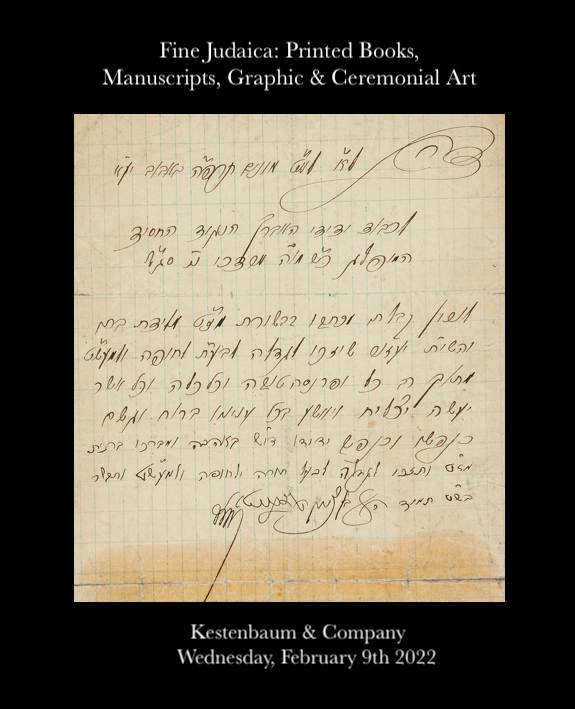<<Koreshige Inuzuka.>> Autograph Manuscript Signed. Notebook belonging to the Japanese aid coordinator for Jewish refugees in Shanghai. Written in pencil, in Japanese, few words in English.

Auction 96 |
Wednesday, February 09th,
2022 at 1:00pm
Fine Judaica: Printed Books, Manuscripts, Rabbinic Letters, Ceremonial & Graphic Art
Lot 158
(JAPAN).
<<Koreshige Inuzuka.>> Autograph Manuscript Signed. Notebook belonging to the Japanese aid coordinator for Jewish refugees in Shanghai. Written in pencil, in Japanese, few words in English.
Est: $4,000 - $6,000
<<Provenance>>: Acquired c. 1990 from the estate of Kiyoko Inuzuka, widow of Koreshige Inuzuka.
Captain Koreshige Inuzuka ( 犬塚惟重, 1890-1965) was the director of the Imperial Japanese Navy's Advisory Bureau on Jewish Affairs from March 1939 until April 1942. Along with his Imperial Japanese Army counterpart, Colonel Yasue Norihiro (see Lot 159) Inuzuka believed that attracting Jews to settle in Japanese-controlled Asia was in the Empire of Japan's best interests.
Inuzuka entered military service in 1912 studying in the Navy Staff College and subsequently served on a number of vessels. Following World War I, Inuzuka was stationed off the coast of Vladivostok during the Siberian Intervention to aid the White Russians against the Bolshevik Red Army. It was there that he came across the Protocols of the Elders of Zion, the Russian anti-Semitic forgery detailing a supposed Jewish worldwide conspiracy. After returning to Japan, Inuzuka gathered a coterie of sympathetic officers who believed in the Protocols. This group of so-called 'Jewish-experts' slowly became larger and more outspoken over the next several years. As war with China approached in the 1930s, Inuzuka came to support the 'Manchurian faction,' a number of military men who believed that control of Manchuria was crucial to Japan's survival. Inuzuka was stationed in Shanghai from November 1934 and came upon the idea of enticing Jews to settle in Manchukuo to help build infrastructure there. Not only would they bring engineering knowledge and creative energy, but Jews living in Manchukuo would, it was thought, bring Japan favor from the United States and other Western nations. Inuzuka believed that gaining the trust of the Jewish people was crucial, as the Jews, in his mind, controlled world markets. The Five Ministers' Conference in 1938 provided the formal go-ahead for Inuzuka and his colleagues to begin setting up a Jewish settlement in Shanghai. In 1939, Inuzuka, along with Colonel Yasue and Ishiguro Shiro of the Foreign Ministry, recommended that Japan set up an autonomous Jewish region near Shanghai; by providing a safe place for Jewish refugees from Nazi Germany to settle, and granting them the political and economic autonomy to live as they desired. In a report to his superiors that year, Inuzuka compared the Jews to a fugu, the famous poisonous fish delicacy that if not prepared correctly could turn lethal. Thus, Inuzuka's plans regarding the Jews came to be known as the Fugu Plan.
Inuzuka, fluent in English, Russian, and French, visited countless schools and synagogues, discussing Jewish problems and seeking aid or support from Jewish communities and organizations. He helped form the Pacific Trading Company, a joint Jewish-Japanese endeavor, and met with many of East Asia's top Jewish leaders, both religious and business. Over the next few years, Inuzuka was central to the operations of nearly every aspect of the Fugu Plan. Along with Yasue and a handful of others, he coordinated everything from choosing and setting up sites for settlements, transporting Jews to these settlements, liaising with Jewish community leaders, all within the bounds granted him by the Japanese government and military. By 1942, however, the Plan fell apart. Japanese aid for Jews would not be tolerated by Japan's ally, Nazi Germany, and Japanese attempts to shuttle Jews through the Soviet Union were halted when Germany launched its invasion of Russia.
Inuzuka's work in rescuing Jewish refugees from Nazi Europe saved him from being tried as a war criminal in post-war Japan.
See D. Kranzler, Japanese, Nazis and Jews (1988) pp. 169-267.
https://collections.ushmm.org/search/catalog/irn522135.
https://en.wikipedia.org/wiki/Koreshige_Inuzuka.
